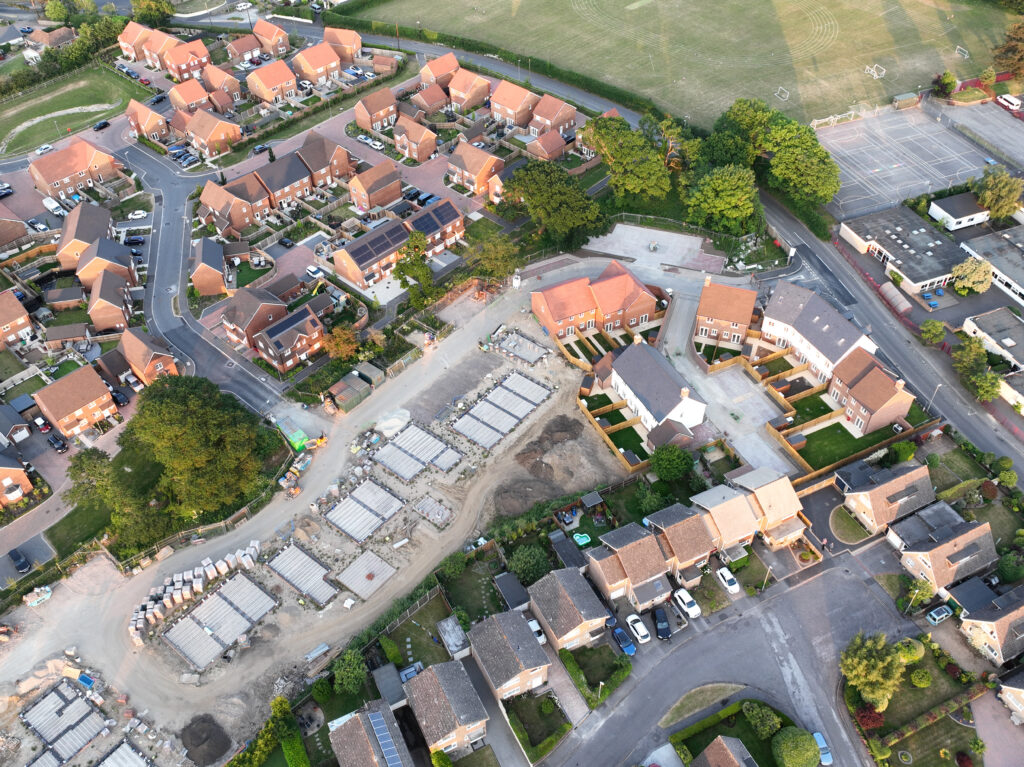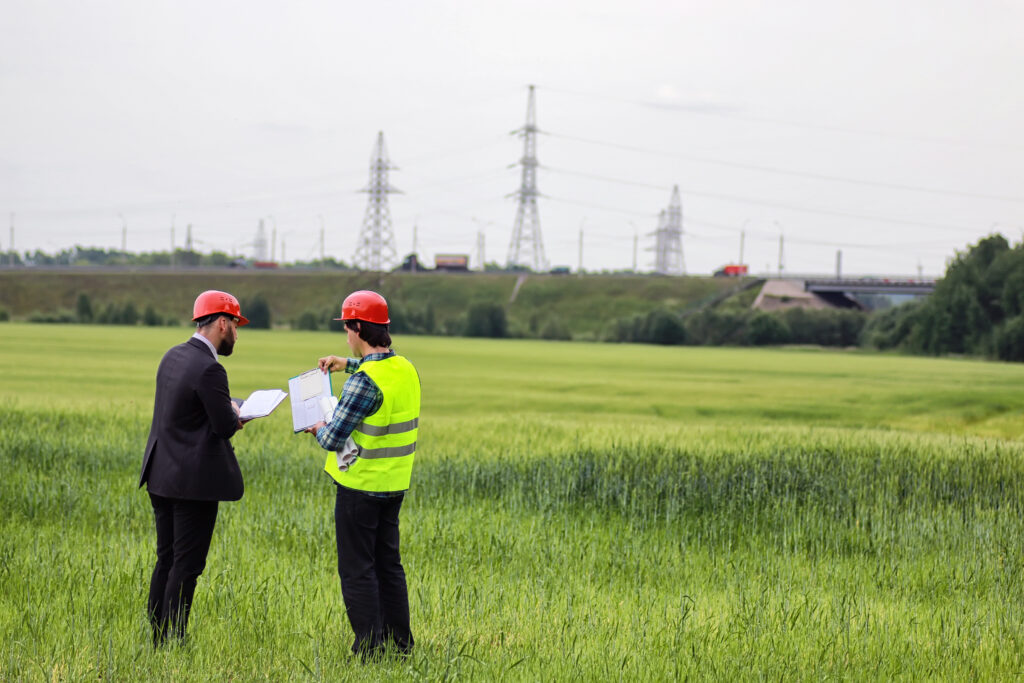Buying & Selling Land for Development
Our team has a wealth of experience in negotiating development agreements effectively and efficiently, ensuring that you are fully protected whilst allowing the development to proceed quickly.
Land Lawyers
As you will only get one chance to sell your land for development it is important to instruct a law firm with sufficient expertise in the area to give you proper advice. Our real estate team work with many of the top UK house builders, which makes us well placed to know exactly what you need to look for when it comes to selling land.
We offer a full range of services for landowners which include:
- Negotiating Option Agreements
- Negotiating Conditional Contracts
- Drafting Planning Agreements
- Due Diligence Services
- Negotiating and drafting Joint Ventures and other Collaboration Agreements
- Negotiating Overage Arrangements
There are many pitfalls in selling land for development. Whether you have already obtained planning permission or whether you wish a developer to do this for you, we would strongly recommend that you come to see us at an early stage so that you know and understand the options available to you to best realise the value of your asset.

Due Diligence Services
There is nothing worse than agreeing a sale of a property or a peice of land and then seeing months go by without a developer committing to the purchase or its development.
If you want to sell land quickly there is no better way than requesting a full due diligence pack from us. Our property lawyers are experienced in acting for property developers and it allows us to know exactly what searches and information a developer is likely to require to enable them to exchange contracts quickly.
An additional benefit of our due diligence service is the swift resolution of any legal issue thrown up by this due diligence.
Strategic Land Agreements
Our Property Lawyers have expert knowledge and extensive experience of dealing with strategic land transactions (acting for both landowner or developer) and therefore are perfectly placed to help you with the sale or purchase of land for development under a long term strategic arrangement.
We regularly act for developers and landowners on both large and small scale strategic development agreements to allow sites to be successfully promoted through the local planning framework and achieve planning consent for residential development.
There are different forms that a ‘strategic land agreement’ can take, including:
Option Agreement: with a variable purchase price which could be based on either:
- A percentage of the market value of the land once planning consent has been obtained
- A fixed sum per Developable Acre of land
- A fixed sum per residential unit (to be constructed on the land)
Promotion Agreement: where an experienced developer or land promoter promotes land for development (and secures planning consent) and then the land is sold on the open market and the promoter and land owner share in the sales proceeds.
Collaboration Agreement / Joint Ventures: where two or more landowners or developers work together with achieve a larger scale development by including various parcels of land in the site for development. This will often involve an equalisation provision between the parties so that all parties receive an appropriate percentage of the total sales prices equal to the size of the land which they are bringing to the collaboration.
Or it may be that an arrangement is an amalgamation of some or all of the above!
By their very nature strategic land agreements will be bespoke to the terms agreed between the parties and therefore it requires a full understanding of the potential issues and ways to resolve these; which our specialists are able to provide.
In addition to the form of agreement itself, there are also other things to consider when dealing with such specialist agreements and arrangements, including Overage Arrangements.
Option Agreements
An option agreement grants the developer a right to purchase the property once planning permission has been obtained.
This is not the same as an obligation on the developer to purchase the property once planning has been obtained (see conditional contract).
The developer should be placed under an obligation to obtain planning permission and this obligation needs to be carefully worded to ensure that he performs that obligation. The option should exist for a limited period of time which would be negotiated taking into account the time it is likely to take for planning permission to be obtained. The developer would normally contribute towards your legal and agent’s expenses in relation to the negotiation and exchange of the option agreement. It is likely that you will require to enter a planning agreement.
You need to bear in mind that, although not impossible, it is difficult to sell your property whilst an option exists over it. The price is likely to be a fixed sum, although it might be index-linked, or a percentage of market value. It could include overage arrangements. Care needs to be taken to ensure that you have the right to use the drawings, reports etc prepared by the developer if it decides not to purchase your property.
Option Agreements – Purchasing land
https://www.herrington-carmichael.com/purchasing-land-option-agreements/
Joint Ventures
A joint venture is where two or more companies decide that they want to work together on a particular project.
These can take many forms but basically, they leave you involved some way in the planning and/or development process.
This might mean that you contribute to the cost of obtaining planning permission and the development and, as a result, of your land ownership then become entitled to a larger share of the profits (assuming there are any). It could be a profit sharing agreement where the Developer obtains planning permission and carries out the development on your land with the result that any profit is shared. Or it can be any combination of the two. Tax advice from your Accountant is vital.
Overage Arrangements
Overage is a sum of money which may be due to a landowner after completion of any sale of the property.
Overage may be due when the developer obtains either a planning permission (if the land is sold without planning permission) or an additional/further planning permission (if the land is sold with planning permission) and the overage due would be based on the difference in the value of the land with or without planning permission (or additional/further planning permission, as appropriate). It is also becoming increasingly common that overage is effectively a profit sharing arrangement between a landowner and a developer and payable once a developer has realised a profit on the development.
There are likely to be tax consequences for overage arrangements.
The wording of overage arrangements can be very complex and it is important that expert legal advice is obtained in ensuring that the overage arrangements reflect the intentions of the parties and that most importantly the developer is obliged to pay the overage to you!
Conditional Contracts
Unlike an Option Agreement, a Conditional Contract becomes binding on the parties when a satisfactory planning permission is achieved. Because of this, it is likely that a Developer will want to impose a set of adverse conditions which, if imposed in a planning permission, would entitle the developer to claim that the planning permission is not satisfactory and walk away from the deal. Care and attention, based on experience of property developments, are essential for the drafting of adverse conditions. The position with regard to price, legal fees, the developers planning obligations planning agreements and overage arrangements together with the difficulty of selling your property elsewhere are similar to those for option agreements.
Planning Agreements
Under Section 106 of the Town and Country Planning Act 1990 as amended, local authorities can require land owners and developers wishing to undertake development within their area to enter into certain planning obligations.
These obligations could include financial obligations to local infrastructure projects, contributions to local education and other services. The obligation could extend to the provision of social housing. It is legitimate for a local authority to refuse planning in the event that the Planning Agreement has not been entered into. It is important to note that anybody with an interest in the land will be required to enter into a Planning Agreement and this includes mortgages. A Planning Agreement can be entered into with the local authority or can be more simply signed by the developer and land owner and presented to the local authority. The latter is known as Unilateral Undertaking.
Planning Agreements should not be entered into by land owners without legal advice. The obligations are given by the land owners and the obligations are enforceable against them by the local authority.
Property & Land Disputes
Whether you are a property or land owner, commercial tenant or landlord, in the event of a dispute our experience covers a range from the complex and high value to the more modest.
We represent clients in the courts, property tribunals, in adjudication and use alternative dispute resolution procedures, including mediation, to resolve disputes. We understand your concerns to avoid the expense and distraction that disputes can bring and we will work with you to find a solution to your problem.
Our approach is tailored to you to provide an effective strategy. We have a dedicated team of dispute lawyers with a range of expertise and experience dealing with property disputes.
Construction
Legal agreements on construction projects are often lengthy and complex with many different agreements required to ensure a successful project. Not only this, but invariably as time goes on projects adapt and morph and it’s important that the contracts are dynamic enough to cater for this.
All construction or development projects of any size will invariably involve a number of different parties with numerous different legal agreements. It is crucial for the smooth running of a project to get an early grasp on what will be required, what basis the parties will be contracting with one another are and what level of contractual protection there is.
Whether you are starting out in the construction industry and require strategic legal advice on the various procurement options, or you are an experienced property developer seeking legal advice on complex developments, we have the experience and knowledge to help.
Due Diligence Services
There is nothing worse than agreeing a sale of a property or a peice of land and then seeing months go by without a developer committing to the purchase or its development.
If you want to sell land quickly there is no better way than requesting a full due diligence pack from us. Our property lawyers are experienced in acting for property developers and it allows us to know exactly what searches and information a developer is likely to require to enable them to exchange contracts quickly.
An additional benefit of our due diligence service is the swift resolution of any legal issue thrown up by this due diligence.
Strategic Land Agreements
Our Property Lawyers have expert knowledge and extensive experience of dealing with strategic land transactions (acting for both landowner or developer) and therefore are perfectly placed to help you with the sale or purchase of land for development under a long term strategic arrangement.
We regularly act for developers and landowners on both large and small scale strategic development agreements to allow sites to be successfully promoted through the local planning framework and achieve planning consent for residential development.
There are different forms that a ‘strategic land agreement’ can take, including:
Option Agreement: with a variable purchase price which could be based on either:
- A percentage of the market value of the land once planning consent has been obtained
- A fixed sum per Developable Acre of land
- A fixed sum per residential unit (to be constructed on the land)
Promotion Agreement: where an experienced developer or land promoter promotes land for development (and secures planning consent) and then the land is sold on the open market and the promoter and land owner share in the sales proceeds.
Collaboration Agreement / Joint Ventures: where two or more landowners or developers work together with achieve a larger scale development by including various parcels of land in the site for development. This will often involve an equalisation provision between the parties so that all parties receive an appropriate percentage of the total sales prices equal to the size of the land which they are bringing to the collaboration.
Or it may be that an arrangement is an amalgamation of some or all of the above!
By their very nature strategic land agreements will be bespoke to the terms agreed between the parties and therefore it requires a full understanding of the potential issues and ways to resolve these; which our specialists are able to provide.
In addition to the form of agreement itself, there are also other things to consider when dealing with such specialist agreements and arrangements, including Overage Arrangements.
Option Agreements
An option agreement grants the developer a right to purchase the property once planning permission has been obtained.
This is not the same as an obligation on the developer to purchase the property once planning has been obtained (see conditional contract).
The developer should be placed under an obligation to obtain planning permission and this obligation needs to be carefully worded to ensure that he performs that obligation. The option should exist for a limited period of time which would be negotiated taking into account the time it is likely to take for planning permission to be obtained. The developer would normally contribute towards your legal and agent’s expenses in relation to the negotiation and exchange of the option agreement. It is likely that you will require to enter a planning agreement.
You need to bear in mind that, although not impossible, it is difficult to sell your property whilst an option exists over it. The price is likely to be a fixed sum, although it might be index-linked, or a percentage of market value. It could include overage arrangements. Care needs to be taken to ensure that you have the right to use the drawings, reports etc prepared by the developer if it decides not to purchase your property.
Option Agreements – Purchasing land
https://www.herrington-carmichael.com/purchasing-land-option-agreements/
Joint Ventures
A joint venture is where two or more companies decide that they want to work together on a particular project.
These can take many forms but basically, they leave you involved some way in the planning and/or development process.
This might mean that you contribute to the cost of obtaining planning permission and the development and, as a result, of your land ownership then become entitled to a larger share of the profits (assuming there are any). It could be a profit sharing agreement where the Developer obtains planning permission and carries out the development on your land with the result that any profit is shared. Or it can be any combination of the two. Tax advice from your Accountant is vital.
Overage Arrangements
Overage is a sum of money which may be due to a landowner after completion of any sale of the property.
Overage may be due when the developer obtains either a planning permission (if the land is sold without planning permission) or an additional/further planning permission (if the land is sold with planning permission) and the overage due would be based on the difference in the value of the land with or without planning permission (or additional/further planning permission, as appropriate). It is also becoming increasingly common that overage is effectively a profit sharing arrangement between a landowner and a developer and payable once a developer has realised a profit on the development.
There are likely to be tax consequences for overage arrangements.
The wording of overage arrangements can be very complex and it is important that expert legal advice is obtained in ensuring that the overage arrangements reflect the intentions of the parties and that most importantly the developer is obliged to pay the overage to you!
Conditional Contracts
Unlike an Option Agreement, a Conditional Contract becomes binding on the parties when a satisfactory planning permission is achieved. Because of this, it is likely that a Developer will want to impose a set of adverse conditions which, if imposed in a planning permission, would entitle the developer to claim that the planning permission is not satisfactory and walk away from the deal. Care and attention, based on experience of property developments, are essential for the drafting of adverse conditions. The position with regard to price, legal fees, the developers planning obligations planning agreements and overage arrangements together with the difficulty of selling your property elsewhere are similar to those for option agreements.
Planning Agreements
Under Section 106 of the Town and Country Planning Act 1990 as amended, local authorities can require land owners and developers wishing to undertake development within their area to enter into certain planning obligations.
These obligations could include financial obligations to local infrastructure projects, contributions to local education and other services. The obligation could extend to the provision of social housing. It is legitimate for a local authority to refuse planning in the event that the Planning Agreement has not been entered into. It is important to note that anybody with an interest in the land will be required to enter into a Planning Agreement and this includes mortgages. A Planning Agreement can be entered into with the local authority or can be more simply signed by the developer and land owner and presented to the local authority. The latter is known as Unilateral Undertaking.
Planning Agreements should not be entered into by land owners without legal advice. The obligations are given by the land owners and the obligations are enforceable against them by the local authority.
Property & Land Disputes
Whether you are a property or land owner, commercial tenant or landlord, in the event of a dispute our experience covers a range from the complex and high value to the more modest.
We represent clients in the courts, property tribunals, in adjudication and use alternative dispute resolution procedures, including mediation, to resolve disputes. We understand your concerns to avoid the expense and distraction that disputes can bring and we will work with you to find a solution to your problem.
Our approach is tailored to you to provide an effective strategy. We have a dedicated team of dispute lawyers with a range of expertise and experience dealing with property disputes.
Construction
Legal agreements on construction projects are often lengthy and complex with many different agreements required to ensure a successful project. Not only this, but invariably as time goes on projects adapt and morph and it’s important that the contracts are dynamic enough to cater for this.
All construction or development projects of any size will invariably involve a number of different parties with numerous different legal agreements. It is crucial for the smooth running of a project to get an early grasp on what will be required, what basis the parties will be contracting with one another are and what level of contractual protection there is.
Whether you are starting out in the construction industry and require strategic legal advice on the various procurement options, or you are an experienced property developer seeking legal advice on complex developments, we have the experience and knowledge to help.
Recent Work
£27.5m Development Site
Acted on behalf of a leading UK-based regional developer on its £27.5 million purchase of a development site with outline planning permission for 248 houses in Mytchett, Surrey, with a developed value of circa £80 million. The transaction was highly complex, relating to a large area of land including numerous titles and contamination-related issues. The transaction also required our team to act on a complex S.106 Agreement which included the SANGS and structured payments for the enlargement of a local free school and independent nursery with six parties to the agreement. We acted for the developer in securing the land and development financing of £12 million to allow for the acquisition of the property. Following completion on the grant of the reserved matters planning permission, the site was re-mortgaged with a £25 million development loan
Land Acquisition for 275 houses
The acquisition of land for two national developers of a development site in Alton, Hampshire for 275 houses.
We acted for the developers in respect of the negotiation of the option agreement approximately four years before the planning permission was achieved and the land acquired. We also acted on a collaboration agreement for the two developers and the infrastructure agreements to allow the development to be constructed.
Long-term site option
Acted on behalf of a leading UK-based regional developer on its £27.5 million purchase of a development site with outline planning permission for 248 houses in Mytchett, Surrey, with a developed value of circa £80 million. The transaction was highly complex, relating to a large area of land including numerous titles and contamination-related issues. The transaction also required our team to act on a complex S.106 Agreement which included the SANGS and structured payments for the enlargement of a local free school and independent nursery with six parties to the agreement. We acted for the developer in securing the land and development financing of £12 million to allow for the acquisition of the property. Following completion on the grant of the reserved matters planning permission, the site was re-mortgaged with a £25 million development loan
Farm Landowner
We are also acting for a farmer landowner near Guildford, Surrey, who has entered into a long term option agreement with a developer, who has recently achieved planning permission for 240 houses. This will be a major development and we are currently actively involved with the landowner ensuring that they receive all the necessary advice and the matter is brought to a successful conclusion.
Legal Insight
Meet the Team
Best Law Firms 2024
Herrington Carmichael has once again been named in the Times Best Law Firms. We were first listed in 2023 and have once again made the Best Law Firms list for 2024.













